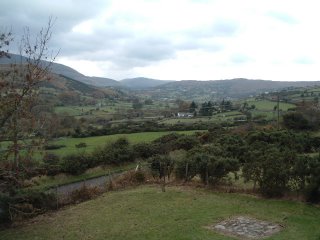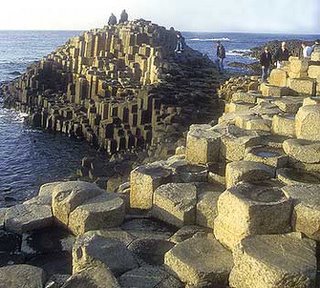
this is to me a very accurate picture of an irish music session. i can see the photographer making the people in the now empty chairs to move so the picture could be made. it reminds me of everything i learned and and experienced my last time in ireland and all the questions i had that went unanswered.
ok, sorry, i thought the three parts were to be three different posts. ha. ok, here we go. here's my writing excerpt:
In the town of Scariff the sun was shining in the sky
When Willie Clancy played his pipes and the tears welled in my eyes.
Many years have passed and gone since the times we had there
But my heart's tonight in Ireland in the sweet County Clare.
My heart tonight is far away across the rolling sea
In the sweet Miltown Malbay, it's there I'd love to be
So long ago and far away but nothing can compare
My heart's tonight in Ireland in the sweet County Clare.
That August in Kilrush when the rain was lashing down
And our hotel was that hay barn on the outskirts of town.
We were all sick and feverish and Dolan had the flu
But Johnny produced some whiskey and the sun came smiling through.
Those nights in Sixmilebridge when the songs and music flowed
And when it came to closing time sure the lights were turned down low
And the sergeant from Kilkishen he would buy us all one more
And we never left that pub before the clock was striking four.
Lahinch and Ennistmon, Liscannor and Kilkee
But best of all was Miltown when the music flowed so free
Willie Clancy and the County Clare I'm ever in your debt
For the sights and sounds of yesterday are shining memories yet.
My heart tonight is far away across the rolling sea
In the sweet Miltown Malbay it's there I'd love to be
So long ago and far away but nothing can compare
My heart's tonight in Ireland in the sweet County Clare.
In the days of Sweeney in the sweet County Clare.
This is actually a song written by Andy Irvine, an amazing irish bazouki player and singer, while he was in an Australian hospital remembering fond days in Ireland. This song came from (please forgive me if i mess up some of the facts, because it is a perfectly wonderful story, and i couldn't find it anywhere online) once when Mr. Irvine was at a music camp called "Willie Week" in memory of Willie Clancy, which is an enormous affair, so i'm told. anyway, they were tired of the great big productions that the sessions had become, and Irvine and some others went searching for another session and came to find Willie Clancy, himself, playing on the street for a few onlookers, being there was no room in the crowded session Irvine had left, and that memory was what later inspired the song. i told this story, even though i don't tell it as well as who told me first, because i love it. it almost seemed disrespectful to tell what i loved about this song and leave out a bit of the history that went into the writing. for me, it's almost as good as the song itself. it's one of those things that make the song and the tradition what it is. it's not about big crowds and productions and stages and stars, like what that crowded session seems to me. it's about playing what you love with great people that all respect the music and the tradition the way you do. like willie clancy, at a camp that bears his namesake, choosing to play on the street rather than fighting his way through a crowd to be the center of an attention that he probably didn't want anyway. and a few people who stumble upon that remember that years later; it had that much of an effect. it's just such an incredible thing to me.
I chose this piece because it says exactly what i feel about Ireland and the music and the people. It's very hard for me to find the words that capture what i love and think about Ireland, but THIS does it, with words and music combined. there's just something about the way it's written that brings back the best of memories, even though they are different than those of the narrator in the song. I have never been to willie week, but when i hear this song, i am immediately sitting in a pub, smelling of a combination of smoke and european guinness, at one in the morning, talking politics and jokes with, although complete strangers, absolute kindred spirits, trading off playing tunes, and loving every minute. it makes me almost cry, just thinking about it, and that's what i get from that song. and it's so much better than i could ever figure out how to say.
what brings me to this class? i don't know whether we were supposed to just pick one subject, or not, but i know i would never be able to do that. i love ireland, and most everything about it. i want to know more about the people, customs, how they think, priorities, language. it fascinates me the differences between being raised in america and anywhere else. i cannot even begin to imagine how they're thinking, and yet we can sit down in a session and be on common ground with the tunes. except, of course, that i have a lot to learn to sound traditional. which is another thing that brings me here. the music is a source of constant amazement to me. how something can be (relative to, say, classical music) simple, and so beautiful and expressive. it's not easy to get right, don't mistake me, but simple on the surface. i love literature, and history, of almost all forms, and comparing american to irish is another fascination and hobby of mine. when we, as americans, think back to "olden days," we think gold rush to California and pioneer days. people in ireland think on "old days" as being before christianity came to the island, or when st. patrick ran all the snakes off the island. they also have an established way of "story telling" that was taught, and that was how history was passed down for a time. There is also no where as beautiful to me as ireland is. i have pictures from my first trip that i brought back, and, after showing a friend of mine from ireland, he said, "where's the people? you just took pictures of rocks and trees and hills. i've seen that stuff!" but it's such beautiful rocks and trees! it's the only place i've been where the ruins of old buildings, and there are plenty of 'em, contrive to make themselves look like an unwritten poem, and where people aren't constantly tearing them down to build new ones. if i've left anything out, i'm sure i want to learn that, too; i've just forgotten it for the moment.








